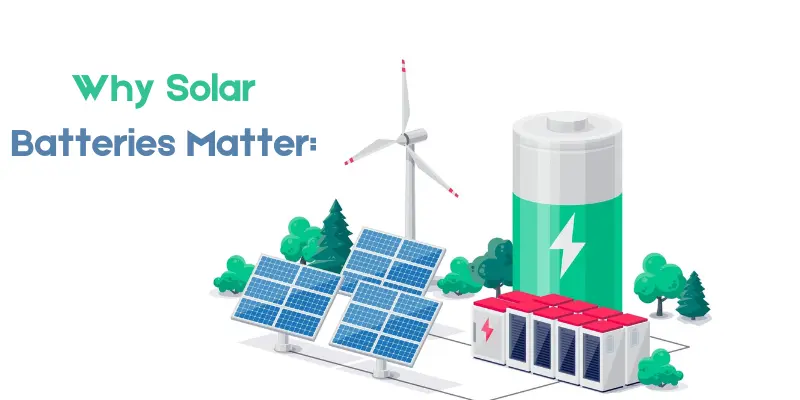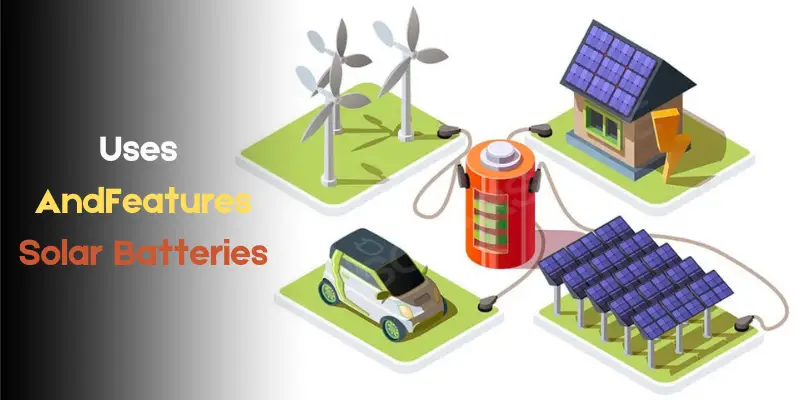Why Solar Batteries Matter: Storing Energy for a Sustainable Future
Updated: 12 Nov 2024
126
Introduction
As more people switch to solar energy, one question often comes up: how do we keep using solar power when the sun isn’t shining? This is where solar batteries come in. Why solar batteries matter: storing energy for the future is all about making solar energy reliable around the clock. By storing the energy collected during sunny hours, solar batteries let us use solar power even at night or on cloudy days. In this post, we’ll explore why solar batteries are so important for a sustainable energy future and how they’re helping us move toward clean, dependable power.
What is “Why Solar Batteries Matter: Storing Energy for the Future”?

Reliable Energy Anytime: Solar batteries store extra energy produced by solar panels during sunny hours, making solar power available at night or on cloudy days.
Power During Outages: Why Solar Batteries Matter, stored energy can be used as backup power during outages, providing energy security.
Supports a Sustainable Future: By allowing us to store and use clean energy whenever we need it, solar batteries help us reduce reliance on fossil fuels and move toward a greener future.
Promotes Energy Independence: Solar batteries give homeowners and businesses more control over their power, reducing dependence on the traditional power grid.
Essential for Renewable Growth: As renewable energy expands, solar batteries play a vital role in making solar power more practical and widely used.
What Are Solar Batteries?
Solar batteries are devices that store extra energy produced by solar panels. When your solar panels generate more electricity than you need during the day, this extra power can be saved in a solar battery instead of going back to the grid.
Then, when the sun goes down or on cloudy days, the stored energy in the battery can be used to power your home, giving you a reliable energy source anytime.
Solar batteries are essential for anyone who wants more control over their energy use. They’re especially useful in off-grid systems where there’s no connection to the traditional power grid, or in areas with frequent power outages, as they provide backup power when needed.
Some benefits of solar batteries include:
- Energy Independence: You rely less on the main power grid, which can save on electricity costs and offer more freedom.
- Backup Power: In case of a power outage, stored energy keeps essential devices and appliances running.
- Reduced Environmental Impact: By maximizing the use of clean, renewable energy, solar batteries contribute to a greener, more sustainable future.
Uses of Solar Batteries

Solar batteries offer several practical applications that enhance the benefits of solar power. Here’s how they’re commonly used:
- Backup Power: Solar batteries store energy that can be used as backup power during outages, keeping essential devices and systems running.
- Off-Grid Systems: For homes and buildings not connected to the main power grid, solar batteries provide a reliable energy source by storing solar power for nighttime or cloudy days.
- Energy Independence: Solar batteries allow homeowners and businesses to rely less on the traditional grid, giving them greater control over their energy use.
- Load Shifting: Some users store solar energy during off-peak hours and use it during peak times, helping to reduce electricity costs when rates are highest.
- Emergency Power Supply: Solar batteries can provide critical power during emergencies, making them valuable for areas prone to power outages or natural disasters.
Features of Solar Batteries
Solar batteries come with unique features that make them efficient and reliable for energy storage:
Energy Storage Capacity: Solar batteries vary in how much energy they can store, allowing users to choose batteries that fit their energy needs.
Rechargeable Lifespan: Many solar batteries have a long lifespan and can be recharged thousands of times, making them a cost-effective choice over time.
Depth of Discharge (DoD): This feature shows how much of the battery’s capacity can be used without harming the battery’s lifespan. Batteries with a high DoD offer more usable power.
Scalability: Solar batteries are often modular, allowing users to add more batteries to increase storage as energy needs grow.
Smart Technology: Some solar batteries come with smart technology for monitoring and optimizing energy use, helping users make the most of their stored power.
| Advantages of Solar Batteries |
|---|
|
| Disadvantages of Solar Batteries |
|---|
|
Conclusion
Why Solar Batteries Matter is clear: they make solar energy reliable, accessible, and practical. By storing extra power for later use, solar batteries provide energy independence, backup during outages, and support for a sustainable future. While there are some costs involved, the benefits of solar batteries make them a valuable addition to any solar power system, helping us harness the full potential of renewable energy.
What is a solar battery?
A solar battery stores extra energy produced by your solar panels. This stored energy can be used later, like at night or during a power outage.
Why solar batteries matter?
Solar batteries let you save and use solar power whenever you need it, giving you more energy independence and making solar energy a reliable source around the clock.
How long does a solar battery last?
Most solar batteries last between 5 to 15 years, depending on the type and how often they’re used. Lithium-ion batteries tend to last longer than other types.
Can solar batteries power my home during an outage?
Yes, if you have enough stored energy, solar batteries can keep essential devices and appliances running during a power outage.
Are solar batteries expensive?
Solar batteries can be costly upfront, but they can save you money in the long run by reducing your electricity bills and providing backup power.
Please Write Your Comments